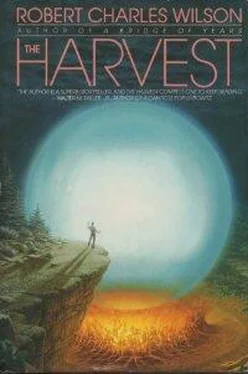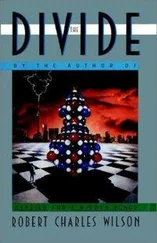She wasn’t surprised when Vince abandoned his skin. Winter was setting in, and Vince had never relished the bitter storms and cold Canadian air that came rolling each year from the north.
Rosa, however, had conceived a different plan for herself.
She had in mind a certain transformation, a dramatic farewell to the planet that had borne her.
It would take time. It would mean staying on the Earth longer than most. Therefore she began as soon as Vince was gone—his skin a delicate memory, carried off on a brisk autumn wind.
She retired to the bedroom of the ranch house, to the old double bed she had shared with him for so many years.
Then Rosa took off her clothes and looked at herself for the last time in the vanity mirror. She saw a bulging gray-haired woman whose expression was no longer perennially sad. Then she stretched out on the bed.
The neocytes in her body dimmed her awareness to make the time pass more speedily. Rosa was suddenly dreamy and afloat.
She weighed 237 pounds that day, a significant mass—enough for the neocytes to work with. Adipose tissue began to change its structure. Rosa’s pores exuded a gray fibrous substance. Within days, it covered her body. Her physical functions dropped to negligible levels. After a week, Rosa ceased to breathe; her heart ceased beating.
Inside her hardened chrysalis, she began to change.
* * *
The pale cocoon lay motionless on the bed all that winter.
Around it, the world evolved. The winter storms that year were particularly fierce. Not the hurricanes that had wreaked so much damage on the coast, but snowstorms that froze the water in the pipes and beveled the house with glittering blue dunes. The wind in January was so violent it broke a downstairs window. Rosa’s bedroom turned cold and a fine lace of frost formed on the mirror; but Rosa was protected from the cold and the wind.
Vince, before he left, had torn down his fences and put the sheep out on the grazing land to fend for themselves. But the sheep were stupid and most of them died that terrible winter.
Not very many miles from the ranch, south past the Colorado border, Traveller organisms had begun to construct the new Artifact. If Rosa had stood at her ice-clad window she would have seen it grow; would have felt the tremors in the bedrock as the Earth’s magma was tapped and channeled; would have seen a ghostly luminescence on starry winter nights.
That spring, as the snow melted and the ground softened, she would have seen Home dominate the southern horizon, a new mountain… would have seen it as A.W. Murdoch had seen it on the day he abandoned the flesh.
But Rosa Perry Connor slept on.
* * *
The days were warming when Rosa finally began to stir. The nights were cold, but the snow was long past.
Each day, she quickened a little inside her chrysalis.
Awareness grew. She felt the process reaching its consummation; felt her new self struggling against confinement.
In a matter of days she would burst free.
Rosa felt the Greater World, too, all the new complexity of it since so many souls had gone over.
But she was not the only one left on the Earth. There had been other transformations.
Many, in fact, on every continent: New creatures half-human or ex-human or subtly post-human.
Like the man, Rosa thought as she rose toward dim consciousness… the boy… the old man who had become a boy…
…who was aware of her, too…
…who, in fact, was very close…
Clamoring for her attention through the medium of the Greater World…
Rosa, he said…
… while she struggled up from a winter’s hibernation… Rosa, we’re very close…
I hear you, boy, she thought. But I’m sleepy. What is it you want? Rosa, the boy said. We’re very close. Rosa, hurry. Rosa, finish what you have to finish, because we’re close now, and you might be in danger.
Chapter 29
I Know What You Are
The caravan pulled into an empty truckstop on I-80.
Home, a mountainous three-quarters disc above the southeastern prairie, turned a deep royal blue as the sun dropped below the horizon. A faint last light played about its apex and gave the high frost a reddish glow.
We shouldn’t linger here, William thought. Home was nearly finished, and soon—within a very few days—it would cast loose from the Earth. No doubt it would be a spectacular sight, but also a dangerous one to any unreconstructed humans in the area. The creation of Home had opened a deep wound in the mantle of the planet. When Home rose toward orbit, the wound would bleed magma; the bedrock would tremble and quake.
William knew all this through the agency of the Greater World, but he didn’t speak of it.
It wasn’t clear whether he should.
He walked a distance from Miriam’s camper, across the still-hot tarmac of the parking lot to an abandoned Honda, and sat on the dusty hood. He wore a sky-blue T-shirt, too big, and a pair of jeans unravelling at the knees, and when he closed his eyes he felt the gentle touch of the cooling air on his young skin.
Debate was raging through the Greater World. As the human polis expanded to completion, it had begun to take over certain tasks from the Travellers—chiefly, the management of the Earth. It was an onerous burden.
The Travellers had approached the Earth like a benevolent but clumsy giant. For all their wisdom, they hadn’t foreseen a ratio of resistance as high as one in ten thousand. They had underestimated the stubbornness of humanity, William thought, no doubt an easy mistake to make. Their own transition from a biological/planetary species to a virtual/interstellar epistemos had been self-generated and nearly unanimous.
But the question remained: How should the human collectivity, the Greater World, relate to this stubborn minority?
Leave them, one faction asserted. They’ve chosen their independence and we ought to respect it Let them find their own destiny. The destiny of the polis was among the stars; the Earth could fend for itself.
It’s inhumane to abandon them, other voices argued. They’re free to choose for themselves, but what about their children? If the human birthright is among the stars, how can we condemn another generation to death?
No resolution had emerged.
William’s problem was a miniature of the larger debate. He knew what Colonel Tyler was; he understood the threat Colonel Tyler posed… but should he intervene?
For the sake of his last sojourn on Earth he had elected to become a child again. He had put a great many memories behind him, stored them temporarily elsewhere, because he wanted this unmediated experience—not just to feel like a twelve-year-old but to be one. And so the Presidency had vanished into the misty past; the Greater World became a presence vaguely perceived.
Now this crisis had forced him out of his ekstasis and troubled him with doubt.
He supposed it wasn’t coincidence that had led him back to Colonel Tyler. Some unperceived connection had been forged as long ago as that day in Washington when he sat in the park with Colonel Tyler’s pistol at his throat. The boy had pedaled aimlessly across America; the man inside had maneuvered him into meeting this sad expedition. It wasn’t clear what events might unfold, but he felt a role for himself in their unfolding.
And a scant half mile down the road was the Connor farmhouse, another dilemma. {Rosa, he broadcast silently. Rosa, hurry!)
He heard Miriam come up behind him. Her footsteps dragged on the gritty parking lot. She’s tired, William thought. Miriam had demonstrated an enormous strength for her age—she insisted on driving her own camper. William recognized and appreciated her resilience. But she tired easily and was often short of breath.
Читать дальше












